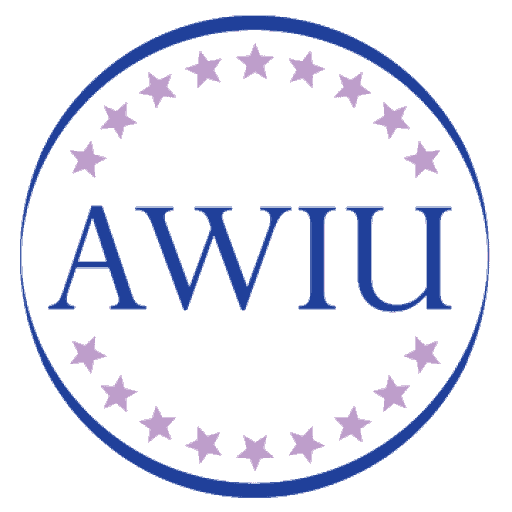
AWIU is honored to have hosted these inspiring women at our annual International Women of Courage Celebration, and continue to support their vital and courageous work through grants.
2018 International Women of Courage Award Winners Bios
Sister Maria Elena Berini
Italy
Nominated by the U.S. Embassy in the Holy See, Sister Maria Elena Berini was born on December 9, 1944 in Sondrio, Italy. When she was 15, she dropped out of school to work in a textile factory to help her father support their family of six. There, she discovered firsthand the difficult working conditions for laborers, as well as a strong sense of worker solidarity. Out of a deep commitment to service, at the age of 19, she entered the novitiate of the Sisters of Charity of Saint Jeanne Anthide Thouret. From 1963 to 1969 she undertook religious, biblical, theological, and teacher training. She became a children’s teacher, but felt a calling to go to Africa. In 1972, she went to Chad where she discovered a love for the people, their traditions, culture, language, and religion. She also witnessed war, hate, injustice, and “indescribable horrors.” She continued her work in rural “bush” schools until 2007, when her congregation sent her to the Central African Republic (CAR). Sister Maria Elena has been working at the Catholic mission in Bocaranga, CAR since then and lived through the war in 2013 and 2014. Most recently, in February and September 2017, the rebel movement “TROIS R” attacked Bocaranga. Thousands of internally displaced people fled their homes and sought shelter at Sister Maria Elena’s mission, where they were welcomed and given refuge. Sister Maria Elena remains hopeful that peace in the CAR is possible.
Sirikan Charoensiri
Thailand
In the immediate aftermath of Thailand’s May 2014 coup d’etat, lawyer Sirikan Charoensiri (known as June) co-founded Thai Lawyers for Human Rights (TLHR), a lawyers’ collective set up to provide pro bono legal services in human rights cases and to document human rights issues under the military government. TLHR has represented hundreds of clients since the military coup, often as the only alternative for those facing politically-motivated charges. Because of the political sensitivity of the organization’s work, TLHR lawyers and staffers, and June in particular, have been subjected regularly to harassment, intimidation, and criminal charges. As a consequence of her advocacy, June is currently facing three sets of criminal charges for her work as a lawyer, including a charge of sedition – the first for a lawyer under the military government. Nevertheless, June continues undeterred in her work.

Aura Elena Farfan
Guatemala
Aura Elena Farfan is a fearless advocate for the families of the forcibly disappeared during Guatemala’s civil war (1960-1996), a bloody conflict that led to the killing and forced disappearance of approximately 200,000 civilians. Farfan has been a human rights activist since her brother disappeared in 1984. She received death threats throughout the years for her work and was kidnapped by armed assailants in 2001. In 2015, Time Magazine named Farfan as one of its 100 Most Influential People. In 2017, she was prominently featured in Finding Oscar, an award-winning documentary produced by Steven Spielberg. Despite the recognition she has received, Farfan has worked quietly over the years, and seldom appeared in the spotlight. Farfan’s 33 years of dedicated work in the quest for justice for families of the forcibly disappeared has inspired a generation of young activists and shines a light on transitional justice efforts in Guatemala.

Godelieve Mukasarasi
Rwanda
Godelieve Mukasarasi dedicated her life after the 1994 Rwandan Genocide to fighting for a culture of peace and non-violence in Rwanda, as well as promoting the rights of women and girls affected by sexual violence in conflict zones worldwide. Founder and Coordinator of the organization Solidarité pour l’Épanouissement des Veuves et des Orphelins visant le Travail et l’Auto promotion/Solidarity for the Development of Widows and Orphans to Promote Self-Sufficiency and Livelihoods (SEVOTA), Mukasarasi works with communities across Rwanda to reset human, social, and economic relations destroyed during the Genocide. In 1996, she was approached by the United Nations team putting together the case against former Mayor of Taba Jean-Paul Akayesu for his role in the Genocide. Overcoming intimidation by community members and the murder of her daughter and husband, likely for her decision to testify at the International Criminal Tribunal for Rwanda, she mobilized four members of SEVOTA to testify against Akayesu. Although rape has been considered an international war crime since 1919, it had never been prosecuted as a war crime until the conviction of Akayesu. These women’s actions, through Mukasarasi’s leadership, changed the world of criminal justice forever, giving women who were sexually assaulted in conflicts a voice and access to justice. Since 1994, SEVOTA has reached over 300 genocide rape victims and helped them to reintegrate socially and economically into their communities. They have organized more than 1,300 households to participate in micro-savings clubs and 2,000 youth and children in peace and development clubs. Mukasarasi is truly a woman of courage, and has been an important figure in the peace and reconciliation of Rwanda and the protection of women and children across the globe. Mukasarasi received the John Humphrey Freedom Award by Law & Democracy (2004); the Outstanding Achievement Award for Rural Women’s Creativity Award from the World Women’s Summit Foundation in Geneva (1996); and, SEVOTA was honored with the Award for Human Rights for its contribution to the promotion of the rights of vulnerable women by Human Right International (2011).

Dr. Feride Rushiti
Kosovo
Dr. Feride Rushiti is founder and executive director of the Kosovo Center for the Rehabilitation of Torture Victims. Through almost two decades of research and advocacy, Dr. Rushiti has secured access to healthcare and justice for civilian victims of Kosovo’s 1998-1999 war. In 2017, her advocacy led to a landmark government decision to fund pensions for Kosovo’s victims of wartime sexual violence, setting a precedent for governmental engagement in efforts to deal with Kosovo’s wartime past. Dr. Rushiti, a medical doctor, began treating civilian victims of war during active conflict in 1999. She was among the first doctors to recognize the need for treatment of psychological trauma for refugees fleeing the violence, particularly among women and minority groups. She pioneered a multi-disciplinary approach to address the needs of conflict victims, envisioning a single organization providing psychosocial support, legal assistance, medication, treatment, and policy advocacy. Dr. Rushiti also played a key role in developing Kosovo’s legal framework for the humane treatment of prisoners and other detainees, advocating successfully for independent monitoring of detention facilities.

Roya Sadat
Afghanistan
Roya Sadat is a creative thinker who refuses to be silenced in the face of threats from conservative elements within Afghan society. Using cinema and television as platforms for advocacy, she is promoting positive change by telling the untold stories of Afghan women and girls. Throughout her career, Sadat has faced enormous risks and has overcome tremendous cultural, bureaucratic, and monetary barriers. Born in Herat in 1981, Sadat always dreamed of being a filmmaker. But when the Taliban came to power, her dreams were nearly crushed as music, movies, television, and theater were banned. Yet Sadat organized secret theater classes in hospitals, refusing to give up her passion. At age 20, Sadat directed her first feature, Three Dots, which she secretly wrote during the Taliban era. The film centers on a young widow who is pressured to marry an in-law. Sadat took major risks to shoot the film in a rural village; at one point, she was chased away at gunpoint by villagers angry at her use of uncovered women actresses. Despite these and other challenges, she completed the film, which received international acclaim. In 2003, Sadat founded Roya Film House to tell compelling stories about Afghanistan. In more than 30 documentaries, films, and television shows, Sadat has not shied away from depicting the brutal injustices of life for Afghan women. In 2013, she founded the Afghanistan International Women’s Film Festival to promote women filmmakers and the empowerment of Afghan women through art. Sadat’s most recent work, A Letter to the President, tells the story of a strong-willed woman who is sentenced to death after accidentally killing her abusive husband. In the process of examining Afghanistan’s culture through cinema, Sadat is doing her part to make her country a better place for women and girls.

L’Malouma Said
Mauritania
L’Malouma Said was born into slavery in 1972 in the far southeastern town of Boutilmitt in Mauritania. When she was seventeen years old, she was a leading activist at her school for the emancipation of Haratines. Before becoming one of only four Haratine women elected as deputy (Member of Parliament) to the Mauritanian National Assembly in 2006 and again in 2013, she was the president of a cooperative of women traders. She was also officer in charge of women within the El Hor movement (Movement for the liberation of Haratines in Mauritania) as well as a founding member of the Mauritanian anti-slavery organization S.O.S. Esclaves, currently led by her husband Boubacar Messaoud. Said is well known for speaking out on human rights issues and her powerful national and international advocacy for the improvement of prisons in Mauritania. She believes Mauritania’s prisoners suffer from a lack of social and educational opportunities, as well as poor safety and health conditions, leading to escape attempts and the spread of diseases among the prison population. Said has a long history of defending human rights and equality, as well as the fight against all forms of discrimination in Mauritania. She is a vocal leader on these issues within the Mauritanian Parliament. She has proven herself to be a courageous woman with a history of commitment, determination, and perseverance in defending human rights issues during her two terms in the parliament.

Aliyah Khalaf Saleh
Iraq
Aliyah Khalaf Saleh, known as Umm Qusay in Iraq, is 62 years old and was born in the Iraqi province of Salah al-Din, not far from Tikrit. Umm Qusay has become a national hero in Iraq despite early challenges such as not having had the opportunity to attend school and being married at the young age of 13. She is a volunteer humanitarian recognized for her bravery in rescuing young Iraqi military cadets ambushed by ISIS on June 12, 2014, the day of the Camp Speicher Massacre. Umm Qusay and her family saw the cadets jumping into the river to save themselves and although they were suffering from the recent loss of their own family members at the hands of ISIS, they had the presence of mind to take action. Umm Qusay rescued 58 recruits over a period of five months. She hid them in small groups, provided them with I.D. cards from the local university to hide their identities, and prepared their escape routes. She took care to teach the Shi’a how to pray as Sunnis to avoid coming to the attention of ISIS. Umm Qusay, a Sunni, believed strongly that each young boy deserved her care whether Christian, Kurd, Turkmen, Yezidi, Sunni, or Shi’a. Her selfless actions in the wake of ISIS’s terror have already been recognized in Iraq, including by the highest Shi’a religious authorities who bestowed on this Sunni woman the title of “Toa’a Al-‘Asr.” Toa’a today is used to describe women who place the wellbeing of others before themselves. In July 2015, Prime Minister Abadi presented her with Iraq’s Medal of the State. Four years on, Umm Qusay continues to receive tribal leaders, military officials, and citizens who want to meet and embrace the Iraqi woman who serves as a beacon of hope for their country in the wake of its liberation from ISIS. She regularly cooks for soldiers and visits the wounded in hospitals. In a tribal society where women are often marginalized or forgotten, and sectarianism is generally placed before nationality, Umm Qusay is a vivid embodiment of the message of a common humanity. In her own words, “We are all created by God. We are all the same.”

Aiman Umarova
Kazakhstan
Ms. Aiman Umarova was born in a small town of the Zhambyl province in south Kazakhstan. Currently, Umarova specializes in particularly serious and grave crimes, related to the sexual abuse of women and children, as well as working with convicted individuals imprisoned for various political and human rights motives. Umarova has two children. One of her hobbies is journalism and she writes a “Zona.kz” column in a public-political newspaper “DAT,” covering the themes of imprisoned individuals, torture and violence in prisons, and human rights. She is also in the process of writing a book about sexual harassment tentatively called “The Bottle of Harassment.” Umarova is a member and defense attorney of the Almaty Regional Bar Association, an expert on the Council on Human Rights under the President of the Republic of Kazakhstan, and the co-founder of the “Human Rights Lawyers” Public Foundation. Initially, Umarova’s desire to protect people and to stand up against societal inequalities led her to a professional career in the law enforcement services, where she continued her career as an investigator. At the same time she was working, she was also continuing her studies to obtain an additional Bachelor in Law degree at the International Academy of Law and Market. Umarova started her full legal career after her work with the law enforcement services, where she worked as a case investigator. One of her main specializations at that time was in the sphere of serious crimes and particularly grave criminal cases, where the main priority was focused on the protection of the rights of women and children. She constantly stands up against injustice in society and notes that her favorite quote is from the African-American abolitionist and women’s rights activist Sojourner Truth “Ain’t I a Woman?” Umarova’s slogan is: “Don’t do it like everyone else and it will not turn out like everyone else’s.”

Dr. Julissa Villanueva
Honduras
Dr. Julissa Villanueva serves as the Director of the Honduran Attorney General’s Forensic Medicine Department, overseeing 650 forensic experts. She began her career as a forensic pathologist in 2002 and was named Director in 2013. Dr. Villanueva has fundamentally changed the nature of criminal accountability in Honduras, especially regarding violent crimes perpetrated against women and children. She has led multidisciplinary, data-driven initiatives to counteract gender-based violence and was a key player in national femicide legislation that imposed additional criminal penalties for gender-based homicides. Her focus on forensic evidence in high-profile cases helped convict murderers when eyewitness testimony was insufficient. Dr. Villanueva developed the first post-graduate medical degree in forensic medicine in Honduras and established the Forensic Science Journal of Honduras, which has garnered a regional audience. She developed the basis for the National Human Identification Registry, in part to address the many unsolved murders in Honduras, and created the first humanitarian cemetery so unclaimed or unidentified corpses could be exhumed later as evidence in criminal trials. In partnership with the U.S. government, Dr. Villanueva is developing DNA capabilities to help identify decomposed bodies recovered along migrant routes and to track unaccompanied minors that attempt to reach the United States through illegal migration. She pioneered the use of Gesell chambers in forensic medicine facilities, which allow victims of sexual crimes or witnesses of murder to provide legal testimony before the court without publicly revealing their identity, eliminating shame and fear of retribution. Dr. Villanueva’s courageous and inspirational efforts have improved the capacity of forensic medicine in Honduras, bolstered evidence used in violent crime cases (many of which are against women), and are essential to the fight against impunity in Honduras.


